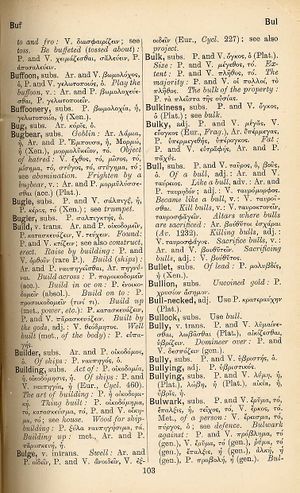bugbear: Difference between revisions
From LSJ
Ὡς χαρίεν ἔστ' ἄνθρωπος, ἂν ἄνθρωπος ᾖ → Res est homo peramoena, quum vere est homo → Wie voller Anmut ist ein Mensch, der wirklich Mensch
(CSV3) |
m (Woodhouse1 replacement) |
||
| Line 1: | Line 1: | ||
{{Woodhouse1 | {{Woodhouse1 | ||
|Text=[[File:woodhouse_103.jpg|thumb|link={{filepath:woodhouse_103.jpg}}]] | |Text=[[File:woodhouse_103.jpg|thumb|link={{filepath:woodhouse_103.jpg}}]] | ||
===substantive=== | |||
[[goblin]]: [[Aristophanes|Ar.]] [[Λάμια]], ἡ, [[Aristophanes|Ar.]] and [[prose|P.]] [[Ἔμπουσα]], ἡ, [[Μορμώ]], ἡ ([[Xenophon|Xen.]]), [[μορμολυκεῖον]], τό. | |||
[[object of hatred]]: [[verse|V.]] [[ἔχθος]], τό, [[μῖσος]], τό, [[μίσημα]], τό, [[στύγος]], τά, [[στύγημα]], τό; see [[abomination]]. | |||
[[frighten by a bugbear]], v.: [[Aristophanes|Ar.]] and [[prose|P.]] [[μορμυλύσσεσθαι]] (acc.) ([[Plato]]). | |||
}} | }} | ||
Revision as of 08:53, 20 May 2020
English > Greek (Woodhouse)
substantive
goblin: Ar. Λάμια, ἡ, Ar. and P. Ἔμπουσα, ἡ, Μορμώ, ἡ (Xen.), μορμολυκεῖον, τό.
object of hatred: V. ἔχθος, τό, μῖσος, τό, μίσημα, τό, στύγος, τά, στύγημα, τό; see abomination.
frighten by a bugbear, v.: Ar. and P. μορμυλύσσεσθαι (acc.) (Plato).

